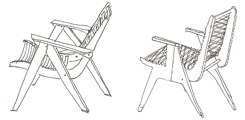‘I am always half afraid of finding a clever novel too clever and of finding my own story and my own people all forestalled.’ Jane Austen, 30 April 1811.
Its strange to think of Jane Austen doing a disservice to women writers but it seems that the sheer weight of her legacy has been such that some of her female contemporaries – equally of not more successful in their day – have been squashed flat by it and lost from view. Now however, perhaps partly because there are only so many times you can re read Austen’s slim ourvre, the works of these elegant writers are being dusted off and appreciatively reopened. The National Library of Scotland has recently hosted an event about the quartet of Scottish writers who rivalled Austen in both success and talent: Mary Brunton (above), Elizabeth Hamilton, Susan Ferrier (below) and Catherine Sinclair. The works of all four have now been published online and the wonderful Virago Press has also reprinted several of the titles. Helen Vincent of the NLS said, ‘…their books are witty and funny and incredibly enjoyable to read as well as giving a Scottish perspective on the world Austen wrote about.’
Sir Walter Scott, whose vast reputation may also have been responsible for keeping his feminine rivals in the shade, famously said, ‘I retire from the field conscious that there remains not only a large harvest but labourers capable of gathering it in.’ He then named Susan Ferrier’s book Marriage – a closely observed tale set in Edinburgh’s New Town – as a prime example. In a line which could have been lifted straight from the pages of a Georgette Heyer, Scott described Ferrier, born 1782 in Edinburgh, as ‘full of humour – without the least affectation of the blue stocking.’
Mary Brunton was born in Orkney in 1778. She eloped with the Reverend Balfour in 1798 after he rowed, dramatically, to her island to carry her away. Encouraged by her husband, himself very successful in the church, Mary wrote two novels with the rather forbidding titles Self Control in 1810 and Discipline in 1818. Fay Weldon, the author of a book about Brunton, described them as ‘fun to read, ripe with incident, shrewd in comment and erotic in intention and fact.’ Jane Austen commented that Self Control was ‘without anything of nature or probability in it’ Ouch. Like Austen, Brunton defended the reputation of the novel form: ‘I think a fiction containing a just representation of human beings and their actions…might be one of the greatest efforts of human genius.’ Sadly Brunton died at 40 after giving birth to a stillborn son – her only child.
The other two names of the literary four championed by the National Library are Elizabeth Hamilton (above), whose book The Cottagers of Glenburnie, was such a hit when it was published in 1808 that a cheap edition was produced so that even working class readers could enjoy it – imagine! Catherine Sinclair, born in 1800, wrote The Holiday House, a children’s book, and Modern Accomplishments, a study of female education and became very popular in America in the mid 19th century at at time when Austen was largely forgotten.
It has been suggested that the championing of Austen’s works by her male relatives after her death contributed to their enduring success. Perhaps this forgotten literary quartet had no such champion or perhaps, as far as legacy goes, it was their misfortune to be near contemporaries of a giant in their particular field. Perhaps five women greats are considered simply too many. Luckily, for their works to live on, all we need do is open the books and read them again.
The NLS has first editions of all fours writers’ work and the books are available to read in Project Gutentberg.





No comments!
There are no comments yet, but you can be first to comment this article.